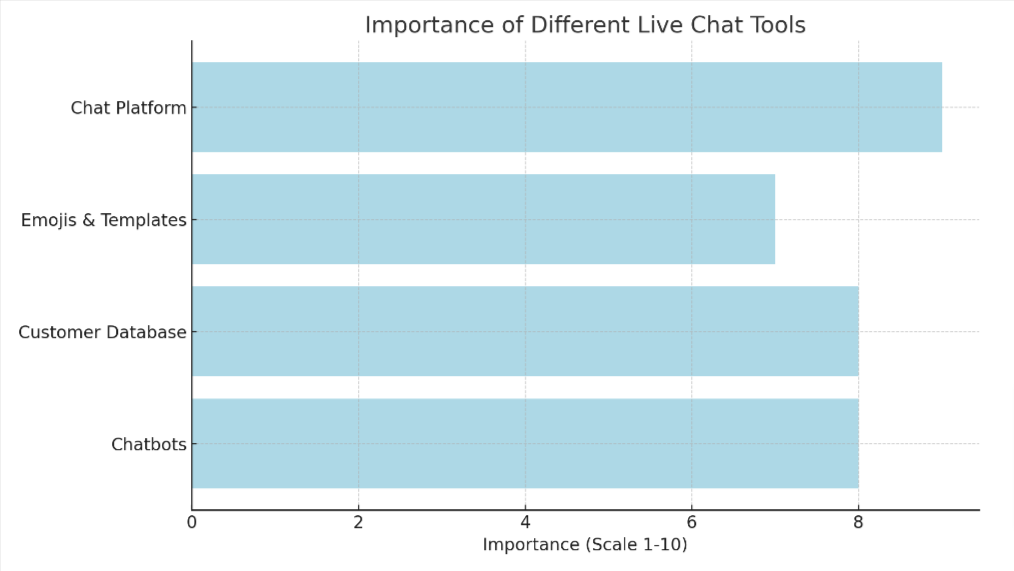Mastering Live Chat Technology: Essential Technical Skills for Success
Dealing with a flood of customer questions can make any chat support agent sweat. Did you know proficient use of live chat tools can boost your efficiency by up to 40%? In this post, we’ll reveal the technical skills that turn a good live chat experience into a great one for both agents and customers.
Dive in and master the art of live chat!
Key Takeaways
- Chat support agents need to master communication, multitasking, and typing skills, along with industry expertise and diligence for effective live chat navigation.
- Proficiency in using live chat platforms and being familiar with various tools like emojis, templates, and customer databases enhances the efficiency of handling customer queries.
- Continuous training in product knowledge and soft skills is vital for chat support agents to provide high-quality service while engaging personalities build rapport with customers.
- Testing multiple live chat tools and integrating them with existing customer service software ensures a seamless experience that suits both business needs and budgets.
- Regular updates on technical proficiency, combined with resources for continuous learning, keep chat support agents adept at navigating current software trends.
Essential Skills for Chat Support Agents
Chat support agents need to possess strong communication and multitasking skills, as well as industry expertise and diligent typing abilities to effectively navigate live chat software and tools.
These essential skills are key in providing top-notch customer service in the online realm.
Communication Skills
Communication skills are vital for chat support agents to effectively resolve customer queries and build positive relationships. An agent must convey messages clearly, whether they’re explaining a complex issue or guiding a customer through a process.
They must listen carefully to understand the needs of the customer, showing empathy and patience in every interaction. Using proper grammar and spelling is also key, as written communication represents the company’s professionalism.
Being able to adapt one’s tone of voice depending on the situation is another essential aspect of good communication. Agents should maintain positivity even when dealing with frustrated customers.
Quick thinking allows them to tailor canned responses so that each reply feels personal and considerate. It’s about finding the balance between being efficient and creating an engaging conversation that leaves the customer feeling valued and heard.
Multi-tasking
Building on strong communication skills, live chat agents must also excel at juggling multiple conversations and tasks without dropping the ball. An effective agent can switch between chats, assess customer needs, and provide accurate information all at a fast pace.
They keep track of ongoing dialogues, respond promptly, and manage resources like FAQs or databases to resolve issues efficiently.
Multi-tasking in live chat demands a high level of organization from agents. They need to prioritize messages based on urgency while ensuring every customer feels heard and valued.
This skill set requires both technical proficiency with the software tools used for navigation during chats and keen problem-solving skills to address concerns effectively as they arise—without sacrificing the quality of support provided.
Industry Expertise
Moving from the ability to juggle tasks effectively, having industry expertise is paramount for chat support agents. They must possess in-depth knowledge of the products and services they represent.
This goes beyond mere familiarity; agents should understand intricate details that customers might inquire about. Keeping up-to-date with industry trends allows them to provide accurate information and solutions quickly.
Agents need to demonstrate technical proficiency as well. They navigate customer service software with ease, ensuring no query goes unanswered due to a lack of IT knowledge. Mastery of these skills ensures every interaction adds value for the customer, fostering trust and loyalty towards the brand they’re assisting.
Typing and Data Entry
Chat support agents need strong typing and data entry skills to keep up with the fast pace of live chat interactions. They must be able to type quickly and accurately while simultaneously navigating through various software interfaces.
Efficient typing and data entry allow agents to respond promptly, helping customers feel supported and valued. These skills enable agents to handle multiple chat sessions efficiently, ensuring that all customer inquiries are addressed in a timely manner.
Moving on to “Diligence”, this essential skill ensures that chat support agents consistently provide high-quality assistance across all customer interactions.
Diligence
Mastering software and tools in live chat requires diligence. It involves being attentive to details, following procedures accurately, and persistently addressing customer issues. Diligence ensures that every step of the interaction is handled with precision, preventing errors and ensuring a smooth experience for customers.
Chat support agents demonstrate diligence by consistently applying their technical skills and problem-solving abilities to resolve customer queries effectively. They also display patience when navigating through various software interfaces and databases to find the information required, ultimately delivering exceptional service with steadfast commitment.
Navigating Software and Tools in Live Chat
Mastering the live chat platform and being familiar with different tools are essential for efficient customer support. Agents should also know how to integrate chatbots, utilize customer databases, and use emojis and templates effectively.
Mastery of live chat platform
Chat support agents must master the live chat platform to effectively assist customers. They should be able to navigate the system swiftly, respond promptly, and manage multiple conversations simultaneously.
A thorough understanding of the software’s features is essential in order to utilize its full potential and provide efficient customer service. Proficiency in using tools such as canned responses, file sharing, and screen sharing can greatly enhance the overall customer experience.
It is crucial for chat support agents to stay updated with any changes or updates made to the live chat platform. This enables them to adapt quickly and continue providing seamless assistance to customers without interruptions or delays.
Familiarity with different live chat tools
To navigate various live chat tools effectively, chat support agents need to be well-versed in different platforms and software. This entails understanding the unique features, interfaces, and functionalities of each tool. It is crucial for agents to have a deep familiarity with different live chat tools to adapt to specific customer needs.
- Proficiency in using popular live chat platforms such as Intercom, Zendesk Chat, or LiveChat.
- Understanding the capabilities and limitations of each tool to provide tailored solutions for customers.
- Ability to seamlessly switch between different platforms based on customer preferences or technical requirements.
- Knowledge of advanced features within each tool, including file sharing, co – browsing, or integration with other customer service software.
- Quick adaptation to any new live chat tools introduced by the organization or integrated into existing systems.
Efficient use of customer database
Agents must efficiently use the customer database to access relevant information quickly. They need to input and update customer data accurately for effective interaction and follow-ups.
Understanding how to navigate, filter, and sort through customer records is crucial in providing personalized support and resolving issues promptly.
Proficiency in using the customer database allows agents to retrieve order history, previous inquiries, or any other pertinent details during live chats. By accessing this information swiftly, they can tailor their responses to meet individual needs effectively without causing delays.
Knowledge of chatbot integration
Chat support agents need to possess knowledge of chatbot integration to effectively leverage this technology in customer interactions. This involves understanding how to set up and manage chatbots within the live chat platform, as well as being capable of customizing them to suit specific customer service needs.
Agents should also be adept at recognizing when it’s appropriate to escalate a conversation from a chatbot interaction to direct human assistance, ensuring seamless communication with customers across all touchpoints.
In addition, agents must stay updated on advancements in chatbot technology and be proactive in integrating new features or capabilities into their existing systems. Familiarity with programming languages like Python or JavaScript can further enhance an agent’s ability to work with chatbot integration tools, allowing for greater customization and problem-solving capabilities.
Proper use of emojis and templates
Using emojis can add a personal touch to interactions, but it’s important to use them sparingly and appropriately. Emojis can help convey tone and emotions within the chat conversation, enhancing customer experience.
Templates can be useful for addressing frequently asked questions or common issues, saving time and ensuring consistency in responses. Proper use of templates ensures that agents provide accurate information efficiently while maintaining a professional tone.
Customers appreciate when their queries are resolved promptly with accurate information. Replacing generic text with relevant emojis and using templates for repetitive tasks can streamline communication, leading to improved customer satisfaction levels.
Assessing and Training Chat Support Agents
Chat support agents need to be well-versed in product knowledge and communication skills. Providing them with continuous training, mock chats, and resources for learning is key to ensuring they are prepared to handle customer inquiries effectively.
Importance of product knowledge
Product knowledge is crucial for chat support agents as it enables them to accurately guide customers and swiftly address their queries. Understanding the company’s offerings allows agents to provide detailed explanations, recommend suitable products or services, and troubleshoot issues effectively, ultimately enhancing customer satisfaction.
With in-depth product knowledge, agents can build trust with customers and offer personalized assistance, leading to a positive impact on sales and brand loyalty.
Having comprehensive product knowledge equips chat support agents with the confidence to engage with customers proactively and respond promptly to inquiries. It also ensures that they can handle complex issues efficiently and contribute valuable insights for improving products or services.
Mock chats for preparedness
Before chat support agents interact with customers, conducting mock chats prepares them for real-time interaction. Here’s a comprehensive list of key aspects to consider:
- Practice scenarios that mimic common customer inquiries and issues to build confidence and familiarity.
- Emphasize the use of appropriate language, tone, and etiquette in resolving customer concerns effectively.
- Provide feedback on communication style and problem – solving approach for continuous improvement.
- Encourage agents to streamline responses while maintaining accuracy in resolving customer issues.
Communication and writing skills training
Improving communication and writing skills is essential for chat support agents. This training involves:
- Learning to convey ideas clearly and concisely to customers, using appropriate tone and language.
- Teaching agents to effectively handle difficult or upset customers, ensuring a positive and helpful interaction.
- Providing guidance on grammar, spelling, and punctuation to maintain a professional image.
- Familiarizing agents with the use of templates to streamline responses while maintaining personalization.
- Emphasizing the importance of active listening and empathy in written communication with customers.
- Encouraging the development of problem – solving skills for addressing customer queries efficiently.
Encouraging engaging and friendly personality
After honing communication and writing skills, it’s crucial to encourage chat support agents to embody an engaging and friendly personality. Agents should express empathy, patience, and positivity in their interactions with customers.
Encouraging a warm and inviting tone can help build rapport, reassure customers, and create a pleasant customer experience. Agents must be adept at diffusing tense situations with humor or lightheartedness while maintaining professionalism.
Fostering an engaging personality also involves actively listening to customers’ concerns and responding appropriately. Acknowledging customer frustrations validates their feelings and demonstrates that the agent is attentive.
Providing resources for continuous learning
Continuous learning is crucial for chat support agents to stay updated with the latest tools and techniques. It involves offering access to online courses, webinars, and knowledge repositories.
By providing these resources, agents can enhance their technical proficiency and customer interaction skills. This continuous training ensures that chat support agents are equipped to handle evolving customer service needs effectively.
Moreover, ongoing learning opportunities can also include shadowing experienced agents during chats or participating in role-playing exercises. These activities help reinforce best practices and foster problem-solving skills while engaging with customers in real-time situations.
Choosing the Right Chat Support Tools for Your Business

When it comes to selecting the right live chat tool for your business, there are several key considerations to keep in mind. From testing different options to integrating with customer service software, finding the perfect fit can make all the difference in providing a seamless customer experience.
Considerations for selecting a live chat tool
When choosing a live chat tool for your business, consider the following factors:
- Compatibility with your existing customer service software and CRM system is essential for seamless integration.
- Look for a tool that offers customization options to match your brand’s tone and style in customer interactions.
- Evaluate the reporting and analytics features to track chat volume, response times, and customer satisfaction.
- Ensure that the tool provides multiple communication channels such as text, audio, and video for versatile customer support.
- Seek a live chat tool with robust security features to protect sensitive customer data and ensure privacy compliance.
- Consider scalability to accommodate your business growth without compromising on performance or user experience.
- Evaluate the ease of use and accessibility for both agents and customers to ensure smooth interactions and efficient problem-solving.
- Look for proactive engagement features such as chatbots, automated triggers, and real – time monitoring capabilities.
Testing different live chat tools
To ensure the best live chat experience for your business, it’s crucial to test and evaluate different live chat tools before making a decision. Here are some essential steps to effectively test different live chat tools:
- Identify specific features needed for your business, such as customizable chat widgets, integration capabilities, or reporting functions.
- Research and gather information about various live chat tools available in the market that align with your business requirements.
- Create a set of criteria to compare and assess each live chat tool, including ease of use, customer support options, pricing structures, and scalability.
- Implement a trial period for selected live chat tools to gauge their performance in real – time customer interactions.
- Seek feedback from the chat support team regarding their experience using each tool, including any challenges faced or standout features they found beneficial.
- Analyze collected data and insights from the trial period to make an informed decision on the most suitable live chat tool for your business needs.
- Consider conducting a pilot implementation of the chosen live chat tool to verify its effectiveness in improving customer service and satisfaction.
- Continuously monitor and assess the chosen live chat tool’s performance, making adjustments as necessary to optimize its utilization within your customer service operations.
Integrating with customer service software
After testing different live chat tools, integrating with customer service software is crucial for providing a seamless experience. Customer service software integration allows chat support agents to access customer information and history in real-time, enabling personalized interactions and efficient issue resolution.
Additionally, it ensures that all communication channels are synchronized, providing a unified platform for customer support. This integration also streamlines workflow by automating repetitive tasks and routing inquiries to the most suitable agent based on their expertise.
This integration plays a significant role in enhancing the overall efficiency of the customer service team while simultaneously improving the customer experience. By seamlessly connecting live chat with other customer service tools, businesses can ensure that their customers receive consistent and high-quality support across all channels.
Providing seamless customer experience
To provide seamless customer experience, chat support agents should focus on prompt responses, personalized interactions, and efficient issue resolution. This involves actively listening to customers’ concerns, addressing their queries with accuracy and empathy, and ensuring smooth communication throughout the interaction.
It is essential for agents to utilize the live chat platform effectively, leverage customer data for personalized conversations, and integrate chatbots where applicable to streamline processes.
By maintaining a friendly and professional tone while using emojis and templates appropriately, agents can also enhance the overall experience for customers.
Moreover, ensuring a seamless customer experience involves understanding each customer’s unique needs and adapting communication styles accordingly. Agents should aim to make interactions as effortless as possible by providing clear instructions or directing customers to relevant resources when necessary.
Balancing costs with features
Chat support tools come with a range of features, and it’s crucial to assess which ones align best with your business needs while considering the associated costs. Evaluate the essential functions required for efficient customer interactions, such as chat routing, canned responses, customization options, and integration capabilities.
Don’t overlook less obvious elements like reporting and analytics – they can provide valuable insights into customer behavior and agent performance.
When choosing the right live chat tool for your business, consider how each feature contributes to improved customer service while ensuring that the investment is justified by tangible benefits.
Keep in mind that a higher cost doesn’t always mean better features; it’s about finding the right balance between expenses and functionalities that fulfill your specific requirements.
Conclusion
In conclusion, mastering the live chat platform and understanding various chat tools is essential for effective customer interaction. Familiarity with the customer database and knowledge of chatbot integration are crucial for providing seamless support.
Efficient use of emojis, templates, and technical proficiency in navigating software contribute to a positive customer experience. Continuous training and resource provision help support agents stay ahead in their technical skills.

